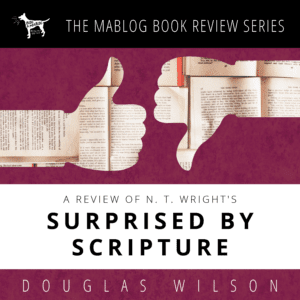Show Outline with Links
As Seen on the Web . . .
Now that’s the way you testify before Congress . . .
What in HELL is going on in Washington D.C.? This man looks demon possessed. pic.twitter.com/ryHJBftcqI
— FluffyDogAttack (@FluffyDogAttack) July 13, 2018
But Don’t Let This Bind Your Conscience
Good advice. pic.twitter.com/Q1XWcQS4pa
— You Had One Job (@_youhadonejob1) July 16, 2018
Latest eBook
-
Surprised by Scripture: Review
$1.00 Select options This product has multiple variants. The options may be chosen on the product page




Hey Doug, any source recommendations for people struggling with the claims of modern historical-critical scholarship and text criticism that seems to undercut inerrancy? Specifically dealing with folks like Barth, Bultmann, Tillich, etc. Thanks!
Jeeves, This is a great question, I hope you also put it in a “letter.” Growing up I had no idea what a critical text was, I didn’t know that there are thousands of variants, or even about the existence of the Septuagint with its many (mostly fairly minor) differences from the Masoretic. I was taught that scripture is unchangeable and inerrant as though it was a platonic form that had desended from the sky. Luckily I learned more about the composition of the texts when I was mature enough to handle it and not have my faith shaken. And… Read more »
Precisely Demosthenes. I, personally, had my faith shaken as a teenager by certain theologians who (in good faith) felt that scripture was lacking. I wish that this was a more debated issue, because I don’t see much being put forward by evangelical scholars to debate people like Bultmann, Barth, Schleiermaacher, etc. I suppose this is because the academics behind this sort of dialogue aren’t the sort that most people would care to read, but there are a few of us who would like to engage in the honest discussion.
The effects of those readings still last, and my faith is somewhat touched by those doubts today. But, I’ve found a more existential sort of foundation to rest on in my understanding of scripture. This has helped practically, but I’m not sure that arguments from experience hold up in the court of reason or work apologetically, which is my main purpose in these questions, to share the gospel more effectively and honestly.
The way the scriptures were written, edited and compiled is a reflection of the way God works through appointed means. The scriptures are not given through a vision or presentation as in Islam and Mormonism (both extreme forms of unitarian heresy). Rather under the guidance and direction of the spirit the scriptures were composed by talented but limited authors, whose style and syntax is evident in the text. (One of my complaints about translations is the degreebto which they smooth out thedifferent voices of different biblical authors) The fact that scripture maintains a coherent narrative and history of redemption is… Read more »
You might find this discussion from last week to be relevant:
https://www.youtube.com/watch?v=NPub-SoDhaQ
At 12:15, they tackle Sam Harris’ objection (from the previous week’s discussion) that anyone today could edit the Bible to be a more moral book than it actually is.
I find their answer much more convincing than the historical-critical scholarship answer to the problem.
John,
I may be misunderstanding Jeeves, but I think his concern is the existence of textual variants, the apparent development in the history of some texts, the questionable claims of authorship in some cases (internal or external), the process of choosing and excluding texts for the canon, etc. Not the question of the morality of the text received.
i feel like I’m either missing something in the video or in the earlier conversation.
You’re right, Demosthenes